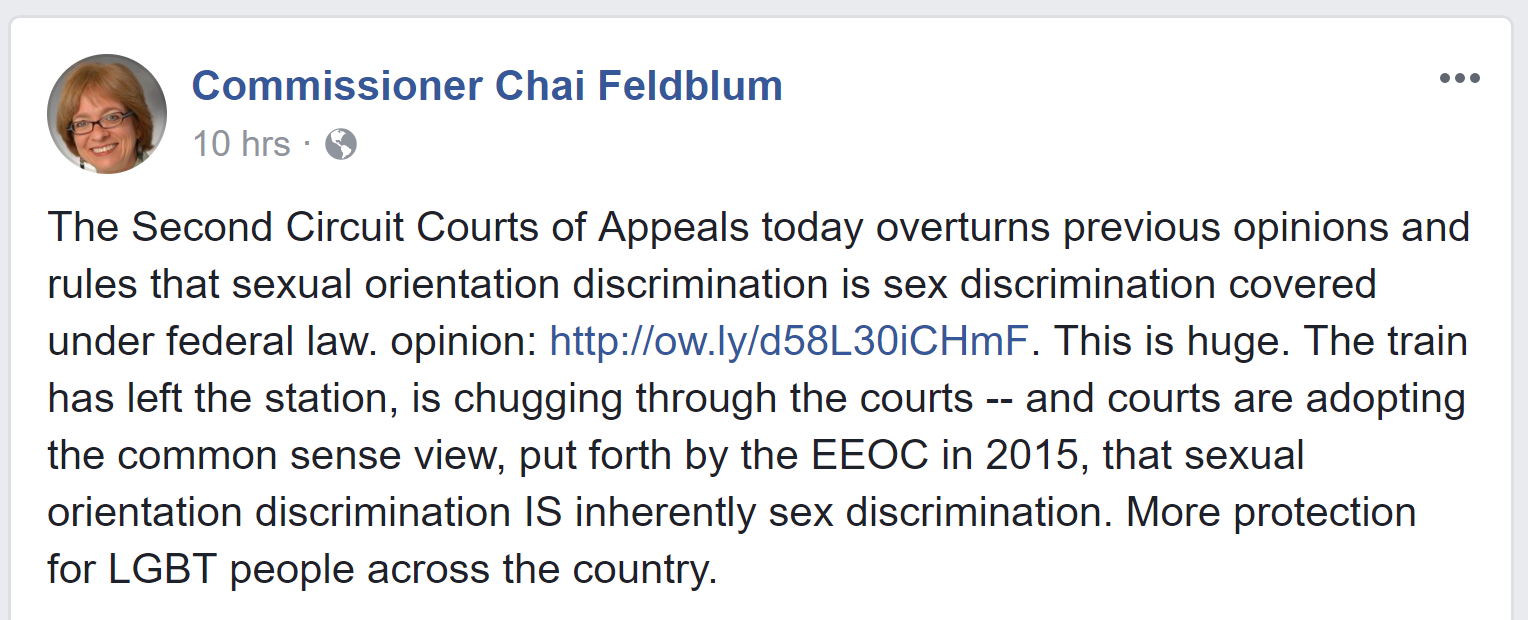Search
Common sense prevails in a big legal victory for gay rights in the workplace

Image Credit: Pixabay.com (https://pixabay.com/en/pride-gay-nyc-new-york-city-flag-2444813/)
It took the U.S. Equal Employment Opportunity Commission about 50 years to recognize that Title VII of the Civil Rights Act of 1964 protected employees from discrimination based on their sexual orientation.
Now, in less than three years since the agency’s groundbreaking decision in 2015, two federal appellate courts have joined in concluding that sex discrimination under Title VII includes discrimination based on sexual orientation, as yesterday, the Second Circuit Court of Appeals in Zarda v. Altitude Express, Inc. issued its long-awaited decision.
Not only was the Second Circuit’s decision long-awaited, but it was also long! It was 69 pages, and that does not include the many concurrences and dissents. Below is a summary of the court’s analysis.
Sexual Orientation Discrimination as a Subset of Sex Discrimination
While the original drafters of Title VII may not have focused on sexual orientation as a protected class — well, they most certainly were not — Title VII is still hella-broad. If you read Title VII, you won’t find terms like “hostile work environment” or “sex stereotyping” either. But, both are unlawful because they involve discrimination “because of…sex.”
So does discrimination based on sexual orientation. According to the court, it’s a subset of sex discrimination:
[T]he most natural reading of the statute’s prohibition on discrimination “because of . . . sex” is that it extends to sexual orientation discrimination because sex is necessarily a factor in sexual orientation. This statutory reading is reinforced by considering the question from the perspective of sex stereotyping because sexual orientation discrimination is predicated on assumptions about how persons of a certain sex can or should be, which is an impermissible basis for adverse employment actions. In addition, looking at the question from the perspective of associational discrimination, sexual orientation discrimination—which is motivated by an employer’s opposition to romantic association between particular sexes—is discrimination based on the employee’s own sex.
…
Because one cannot fully define a person’s sexual orientation without identifying his or her sex, sexual orientation is a function of sex.
So, sexual-orientation discrimination, which is rooted in sex stereotypes, is a subset of sex discrimination and, therefore, unlawful.
And, if you want some more language to quote in your next legal brief to uphold gay rights under Title VII, try this on:
[A]n employer who discriminates against employees based on assumptions about the gender to which the employees can or should be attracted has engaged in sex‐ discrimination irrespective of whether the employer uses a double‐edged sword that cuts both men and women.
Subsequent Legislative Developments
What did the court make of failed legislative attempts to amend Title VII to explicitly include sexual orientation as a protected class?
Not much.
This theory of ratification by silence is in direct tension with the Supreme Court’s admonition that “subsequent legislative history is a hazardous basis for inferring the intent of an earlier Congress,” particularly when “it concerns, as it does here, a proposal that does not become law.”
…
We do not know why Congress did not act and we are thus unable to choose among the various inferences that could be drawn from Congress’s inaction on the bills identified by the government.
…
Although sexual orientation discrimination is “assuredly not the principal evil that Congress was concerned with when it enacted Title VII,” “statutory prohibitions often go beyond the principal evil to cover reasonably comparable evils.” In the context of Title VII, the statutory prohibition extends to all discrimination “because of . . . sex…”
There you have it! The Second Circuit overrules two prior Second Circuit decisions to the contrary and concludes that discrimination based on sexual orientation is unlawful under Title VII.
Takeaways for employers.
I’ll defer to EEOC Commissioner Chai Feldblum, who captured the importance of the decision in this Facebook post.
 The Employer Handbook Blog
The Employer Handbook Blog



